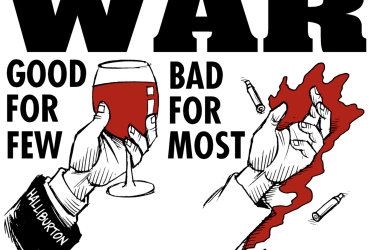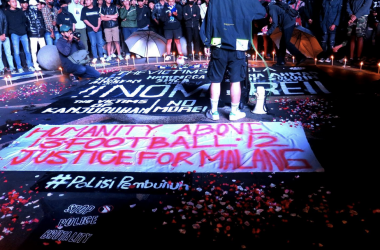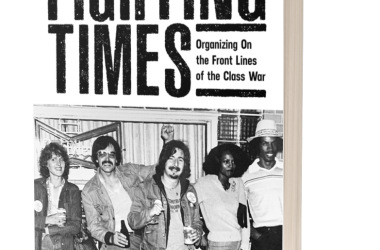By Gabriel Kuhn
Sometimes you experience the ultimate anti-climax. With three PM Press books released these months, I had been planning for about a year to come for an extended speaking tour to North America this spring. A couple of months ago, I started planning this more concretely. The anarchist bookfairs in San Francisco, New York, and Montreal provided general reference points, and I got in touch with many wonderful people who helped schedule events in twenty US states and two Canadian provinces. I was also looking forward to the trip on a personal level: I have been traveling to the US regularly since I was nine years old, did part of my schooling there, and meant to visit many dear friends. Admittedly, I was worried about immigration, as I’ve had problems before – one reason why I haven’t visited in five years – but I figured I’ll come well prepared. Little did I know that the recently introduced Electronic System for Travel Authorization (ESTA) would make it impossible for someone matching an entry on the US government’s No Fly List (also known as the Terrorist Watch List) to even board a plane. I considered the process a mere formality, and it actually took me a week to check the outcome of my application. So when the words “Travel Not Authorized” appeared on my computer screen, I instantly thought of a mistake. Certainly I must have missed a letter or digit in my application form. I checked the records. I hadn’t missed anything. Nonetheless, I applied again. It only took a few hours to receive another rejection.
Now, here is one thing about the No Fly List: in the name of national security, it is virtually impossible to receive any information about it. Not why your name is on it, not since when, not what you can do to get off the list – in fact, you won’t even know whether it’s really your name or whether your name matches that of some other “terrorist” suspect. However, after speaking to embassy staff, a mix-up is unlikely in this case. Once it had sunk in that my name was on the list, I had a pretty clear understanding of where the origins of this lay.
When I arrived in the US the last time, in 2005, I was held for seven hours at Philadelphia Airport. First, the stamps of Arab countries in my passport had raised suspicion, then some organizations in my address book, then the literature in my backpack. The immigration officers deemed it necessary to call in an FBI anti-terrorist agent. We went through a pretty ridiculous interrogation, with some other agents storming in at some point, frantically demanding that I get up and put my hands against the wall – apparently, they had found a weapon in my luggage: a camping knife. Once they understood that I had no other “weapons” on me, they relaxed, and I was allowed to continue with the interrogation in relative peace. Eventually, the frustrated FBI agent said, “Now I know why you’ve studied philosophy – so you can answer all my questions without saying anything.” I felt like I had done well. Then he recommended that I return to Europe voluntarily on the next flight. That way I could “get my papers in order” (I had no papers that weren’t in order) and “reapply” for entry to the US – otherwise I’d be removed forcefully, which would automatically imply a five-year ban. I told him that if I was to be removed forcefully there was little I could do (after all, the agents had far more serious weapons than me), but that I certainly hadn’t taken an eight-hour flight to Philadelphia to voluntarily turn around and fly back. Since his bluff didn’t work, the agent was in a bit of trouble: at the time, I still had a valid B1/B2 visa issued by the US embassy in Vienna in the late 1990s, which meant that a report had to be filed if I was to be removed. Since none of the agent’s suspicions – in the end focusing on Earth Liberation Front connections – were based on anything substantial, there was nothing substantial to base a report on either. Grudgingly, I was allowed to enter, although the duration of my stay was severely limited – basically, the officers in charge did what they could within their means to spoil my visit. This was sold to me as generosity.
As I left the country within the time I had been given, I thought this incident would have no further consequences. As things stand now, though, it must have earned me a spot in the Terrorist Watch List. The agent got his way after all.
If you are denied authorization to travel to the US through ESTA, you can still apply for a visa at a US embassy. However, three things have to be considered: 1. Unless you are convinced that your case is obviously one of mistaken identity, it is unlikely to be granted. 2. Even if it is granted, it will take a long time, as you’ll have to undergo special security screening. 3. Even if you end up getting a visa, it will have been issued by State Department employees – Department of Homeland Security agents might still turn you away upon arrival. Under these circumstances, it became impossible for me to continue planning my tour (which was to start in a month), and I had to cancel. Luckily, the support I’ve received from friends and organizers in the US since then has been fantastic, and some of the events I had planned will still happen – others are stepping in as speakers, web conferences have been offered, etc. It’s like the saying goes: you can ban people but not ideas.
In the long run, I could fight my inclusion in the No Fly List, but I’m not really inclined to do so. It is a time-consuming, costly, and personally compromising affair, and, despite my sadness and disappointment, this individual case is far from tragic: I have a comfortable life in Sweden, I can travel to numerous other countries, etc. What’s really worrying are the far bigger problems that this case is an indication of: 1. The complex of immigration and anti-terrorism legislation, which for many people means separation from loved ones, exclusion from educational and economic possibilities, and at times persecution, imprisonment, and death. 2. The fact that in the name of “national security” means of surveillance and repression have been put into place that are entirely secretive and non-transparent – the possible implications of this are evident and very frightening. 3. The fact that institutions like the No Fly List not only trample on the rights of US citizens, but leave non-US citizens with no rights to fight them at all. If applied systematically, this could severely undermine communication, exchange, and networking of activists and social movements. If this particular case can help draw some attention to these issues, at least it serves a purpose.
Many thanks to everyone who’s shown so much support over the last couple of months and the last few days! I’ll see you all sometime somewhere!
More blogs from Gabriel | Back to Gabriel Kuhn’s Author Page





